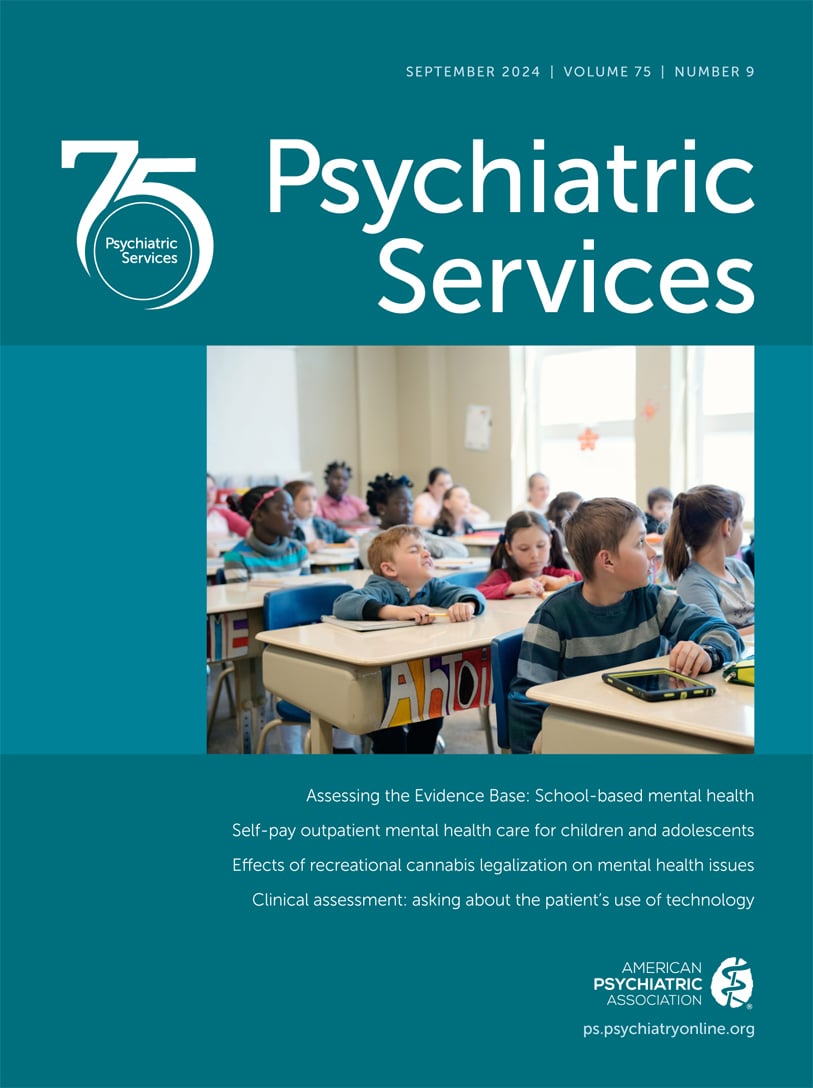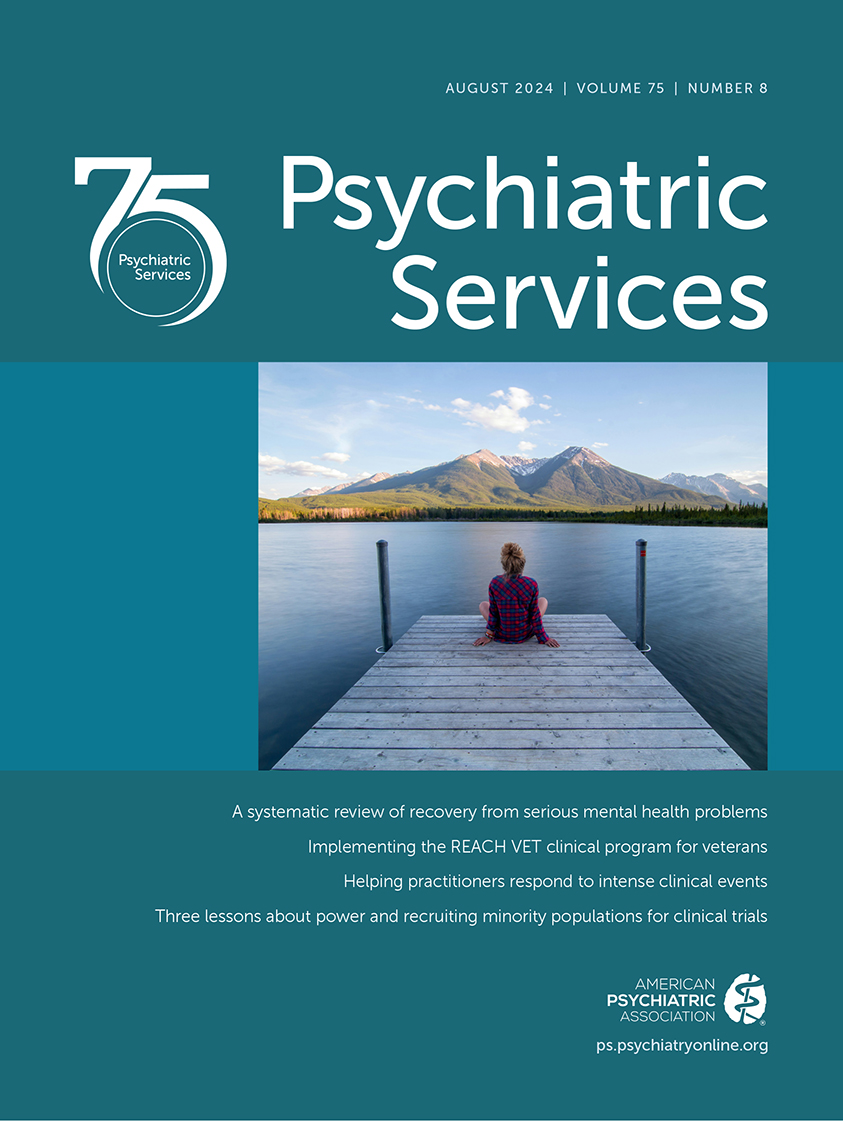Psychiatric Services
- Volume 41
- Number 8
- August 1990
Article
Publication date: 01 August 1990
Pages850–854Clozapine therapy for treatment-resistant schizophrenic patients resulted in decreases in psychopathology and reductions in mental health service costs. The majority of these savings were due to reduced use of inpatient hospital services. Reduction of the ...
https://doi.org/10.1176/ps.41.8.850Publication date: 01 August 1990
Pages863–869Clozapine, an effective but expensive drug treatment for patients with severe, chronic schizophrenia who are unresponsive to conventional antipsychotics, is associated with a high risk of agranulocytosis, which is sometimes fatal. Weekly blood tests to ...
https://doi.org/10.1176/ps.41.8.863Publication date: 01 August 1990
Pages870–874Clozapine holds great clinical promise for some chronic schizophrenic patients. However, limitations on access to the drug by the largest subgroup who need it, the indigent, are causing frustration for patients, their families, physicians, and public-...
https://doi.org/10.1176/ps.41.8.870Publication date: 01 August 1990
Pages876–877Carl C. Peck, M.D., director of the Center for Drug Evaluation and Research of the Food and Drug Administration, outlined FDA's position on clozapine's monitoring system in a letter to officials of the American Pharmaceutical Association in mid-March. The ...
https://doi.org/10.1176/ps.41.8.876Publication date: 01 August 1990
Pages878–880In a large state hospital population, more treatment-resistant schizophrenic patients may be clinically eligible to receive clozapine than the hospital can afford to pay for, given the costs of the medication and its mandatory monitoring system. The ...
https://doi.org/10.1176/ps.41.8.878Publication date: 01 August 1990
Pages880–882Three ethical constructs of distributive justice—utilitarianism, Marxism, and the theories of John Rawls—are applied to selection of patients for treatment with clozapine. Elements of an ethical selection process include a means of monitoring the clinical ...
https://doi.org/10.1176/ps.41.8.880Publication date: 01 August 1990
Pages882–885The long-term efficacy of clozapine therapy and its effect on health care costs were examined over a two-year period. Patients on clozapine showed marked clinical improvement as measured by the Brief Psychiatric Rating Scale. They also had significantly ...
https://doi.org/10.1176/ps.41.8.882Publication date: 01 August 1990
Pages886–890The efficacy and adverse effects of clozapine for patients who cannot be treated with conventional neuroleptics were evaluated by means of a retrospective chart review. The review showed that 85 percent of 503 inpatients experienced slight to nearly ...
https://doi.org/10.1176/ps.41.8.886Publication date: 01 August 1990
Pages892–897The effect of approximately six months of treatment with clozapine on the quality of life of 38 treatment-resistant schizophrenic patients was prospectively studied in an open trial. The Quality of Life Scale was used to provide an objective measure of ...
https://doi.org/10.1176/ps.41.8.892Publication date: 01 August 1990
Pages898–901The sudden improvement in long-term schizophrenic patients after treatment with clozapine is frequently disconcerting to their families. In many cases the patients appear to have increased hostility toward their families because of the alleviation of ...
https://doi.org/10.1176/ps.41.8.898Publication date: 01 August 1990
Pages902–911Contemporary sociological research has expanded knowledge about how the label of mental illness affects individuals and about how patients' and psychiatrists' social characteristics affect the assessment and treatment of mental disorders. The authors ...
https://doi.org/10.1176/ps.41.8.902Publication date: 01 August 1990
Pages912–915Psychiatrists and nonphysician mental health professionals working in community mental health centers have difficulty establishing the scope of their expertise, defining the limits of their roles, delegating responsibility, and sharing professional ...
https://doi.org/10.1176/ps.41.8.912Publication date: 01 August 1990
Pages916–920A psychogeriatric outreach team provides in-home evaluation and treatment for elderly persons living in high-rise public housing in Baltimore. During the first ten months of the team's operation, housing staff referred 9.5 percent of the elderly residents ...
https://doi.org/10.1176/ps.41.8.916Publication date: 01 August 1990
Pages921–922Children of mentally ill persons are a high-risk group. They have an increased suicide rate and are affected by their parents' mental illnesses in other diverse ways. Caregivers of adults with major psychiatric disorders should be aware of these children'...
https://doi.org/10.1176/ps.41.8.921Publication date: 01 August 1990
Pages924–927This pilot project demonstrated that for selected youth, a supported independent living program can be an effective resource in bridging the transition from home to fully independent living. For some young people, the program may serve as a respite from ...
https://doi.org/10.1176/ps.41.8.924Past Issues
View Issues Archive
Vol. 75 | No. 11

Vol. 75 | No. 10

Vol. 75 | No. 9
